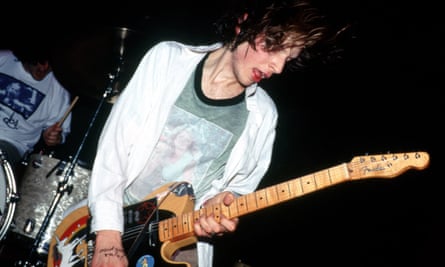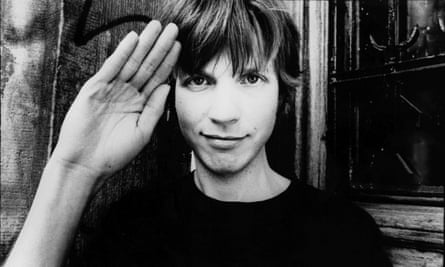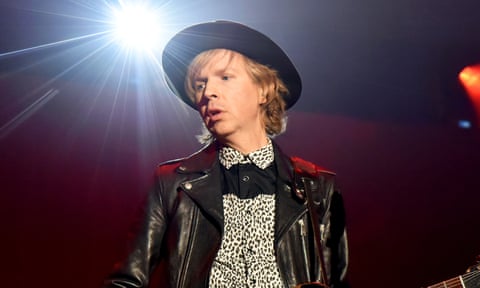30. See Through (2019)
Beck’s most recent album, Hyperspace, was a missed opportunity, a gorgeously produced modern R&B album with barely any strong tunes. But See Through is good – its wash of synths paired with a staccato chorus makes it evocative of Swae Lee.
29. Up All Night (2017)
After winning album of the year at the 2015 Grammys for Morning Phase, Beck rode his rising pop cultural stock and made the poppiest record in his catalogue, Colors, which sounds a bit like Maroon 5. The production is so shiny that nothing can permeate it – much of the time, not even the listener – but there are some reasonable moments, such as the corny disco-dad moves of Up All Night.
28. Heartland Feeling (1993)
As far from Colors as you can imagine, this no-fi anti-folk song is from the debut album, Golden Feelings. It opens with someone rambling about John Cougar Mellencamp and Bruce Springsteen, and so this song is Beck’s pastiche of that all-American songcraft – but the vivid character studies burn away any irony. There is more of this appealingly scratchy stuff on 1994’s Stereopathetic Soulmanure, a collection of noisy blurts, tracks called things such as Aphid Manure Heist, and bluegrass songs about taco-dispensing devils – a more involving listen than his major-label debut Mellow Gold.
27. Teenage Wastebasket (1994)
The young protagonist of this song makes the loser of Loser look like they are doing a Harvard MBA – a teenage girl “trying to experience everything at least once” with a combative stance and poor personal hygiene. “Socks don’t matter / Teeth are turning green / Opinions are forming,” Beck notes drily, to a lo-fi garage rock backing. It’s a lost song that was eventually released on the deluxe 2009 reissue of One Foot in the Grave.
26. Walls (2008)
A lovely two-minute jewel studded into Modern Guilt, his 2008 album with Danger Mouse. Two cratediggers working together inevitably end up with a killer sample – Paul Guiot and Paul Piot’s French lounge track Amour, Vacances et Baroque underpins this yé-yé ballad, with backing vocals from Cat Power murmured deep in the mix.

25. Get Real Paid (1999)
Beck’s catalogue is full of fond homages – here he pops and locks to 1980s electro, sampling Kraftwerk, nodding to Adamski’s Killer, and intoning consumer fantasies in a robot voice. The chorus then switches focus to Prince, who was such a totemic figure for the Midnite Vultures album this featured on.
24. Seventh Heaven (2017)
The best song from Colors is peppily upbeat and sounds great when emanating from a sun-warmed car dashboard. Powered by handclaps, its dreamy chorus heads for the clouds at a 45-degree angle – Phoenix, and the delivery of their vocalist Thomas Mars, are surely a big influence.
23. Nausea (2006)
Some of Beck’s earliest songs were just him and a twanging guitar, like a delta bluesman sitting on a porch, but that twang rattles through his whole catalogue – even on much bigger productions such as this hoedown from 2006 album The Information. It’s backed with another signature of his: loose percussion, as if sourced from a junkyard.
22. Lampshade (1994)
From the A Western Harvest Field By Moonlight EP, another grab bag of early lint-covered oddments, Lampshade has one of Beck’s first truly indelible melodies. It presages the mournful songs he would write for Sea Change and Morning Phase, but done as a simple Gillian Welch-style bluegrass ballad with guitar and harmonica, as he longs for a love with less intensity (“Putting on a lampshade ’cause you’re shining way too bright”) – and sounds guilty as hell for feeling that way.
21. Mixed Bizness (1999)
Even though it was Grammy-nominated for album of the year and sold more than a million copies, Midnite Vultures wasn’t quite the smash it should have been – Beck’s infectious lounge-lizard confidence is the stuff of superstars. Here he sets up ska-funk verses and a James Brown-style call and response for the chorus, with lyrics that suggest paint a psychedelically bougie lifestyle: “Visine at the canteen … pour champagne on a honeybee.”
20. Tropicalia (1998)
Mutations is a classic example of an artist swerving back into the dirt just as they have reached the open road: a bummer album of wonderfully downbeat blues after the blockbuster Odelay. But sat in the middle is this cheery homage to Brazilian bossa nova, shimmying around a walled garden that has filled up with heat.
19. Broken Drum (2005)
A stark and startling portrait of a toxic relationship, set to trudging desert blues and a brawny two-note riff. “We shoot our guns / we have fun,” he sings, ruefully acknowledging the friction, but admitting he can “never forget you”.
18. Cellphone’s Dead (2006)
A truly classic bassline, perhaps Beck’s best, turns this into an elastically danceable bit of boogie. It’s interesting to think how he might have deployed it on the screwball Midnite Vultures – seven years later, on The Information, it makes for a moodier proposition.
17. Missing (2005)
That tropicália influence is wielded with greater subtlety here, on a track that brings together two of Beck’s chief moods under a brooding sky: Brazilian pop and string-swept ballads of existential crisis. The insistent claves and one-note guitar make for a beautiful, minimalist rhythm section.
16. Chemtrails (2008)
Beckologists may come to see Modern Guilt as a transitional album, a loose 33-minute sketch pivoting from The Information to Morning Phase as he recovered from a spinal injury – but it is stronger than either of them. Chemtrails is the high point: Danger Mouse gives the constant guitar fills real heft, while Beck’s falsetto melody line, cruising through the upper atmosphere, has a childlike naivety.
15. The Golden Age (2002)
The opening track on Sea Change, Beck’s finest top-to-bottom album by some chalk, The Golden Age unveiled a man who was for ever altered – it was written amid his split from his fiancee, Leigh Limon, with whom he had been for nine years. The weight of the world, mentioned in the lyrics was heavier than ever, and yet worn lightly and tenaciously amid Nigel Godrich’s crystalline production.
14. Paper Tiger (2002)
This song is also from Sea Change, and on it Beck stalks a mythic landscape strewn with portents and symbols of his failed marriage: capsized boats, broken diamonds and the horrible image of “a stray dog gone defective”. The arrangement is superb, with a smoothly funky bassline set against clusters and lengths of strings – it samples Serge Gainsbourg, and acts as a kind of homage, too.

13. Devil’s Haircut (1996)
Cellphone’s Dead may have Beck’s funkiest bassline, but for brute force, Devil’s Haircut wins with its insistent three-note riff copied from I Can Only Give You Everything by the 60s Northern Irish rockers Them. There’s something mordantly catchy about the chorus’s repetitious melody, and the lyrics are full of his trademark hippy phantasmagoria: “Temperature’s dropping at the rotten oasis / Stealing kisses from the leprous faces.”
12. Round the Bend (2002)
The most desperate moment on Sea Change, devoid of percussion aside from the thrum of guitar, sat outside a cocoon of strings that Beck is seemingly insulating himself inside as he ponders his breakup. “Loose change we couldn’t spend” neatly conjures up one of the ways love fails: when you have the will but not the emotional means.
11. Nobody’s Fault But My Own (1998)
Developing the lo-fi blues of his early work and pre-empting Sea Change’s pellucid studies of a wrecked relationship, Beck’s wallowing is given an almost mystical edge by Indian drones and sitar tolling underneath it. Even more so than the lyrics, it is the hangdog sense of resolution to the chorus melody that suggestsBeck accepts his screw-ups.
10. Sexx Laws (1999)
The wacky streams of consciousness Beck honed on 1996’s Odelay scanned more satisfyingly than ever on this sassy single, like William Burroughs kicking it with Bootsy Collins in Bosch’s Garden of Earthly Delights: “Neptune’s lips taste like fermented wine / Perfumed blokes on the Ginza line”, and many other wonders besides.
9. Qué Onda Guero (2005)
Perhaps aware of how he might be seen, a white man playing non-white musical forms, Beck self-satirised with his 2005 album Guero, Spanish slang for a light-skinned person (he didn’t go as far as calling himself a “gringo”). Qué Onda Guero sees him rolling around a Latino neighbourhood soaking in the chatter and noise, while the backing is like a honkyfied take on Wu-Tang Clan’s Shame On a Nigga.
8. It’s All In Your Mind (1993 version)
Distrust and mistrust intertwine in this timelessly beautiful song. The sumptuous rerecording on Sea Change is lovely, but the lo-fi original (released as a 1995 single), backed simply by rhythm and lead acoustic guitars, really lets its yearning, half-resigned melody sit front and centre.
7. Where It’s At (1996)
Beck’s brand of geeky white hip-hop reached its zenith on this breezy tune cobbled together from various samples (including from a sex education film) and a gorgeous keyboard motif. He plays party organiser, driving us out to a little club on the edge of town where people clearly make their own fun with two turntables and a microphone. The ramshackle vibe is totally charming.
6. Guess I’m Doing Fine (2002)
The depths of dejection meet stoic resolve in this masterpiece of mope. “It’s only tears that I’m crying / It’s only you that I’m losing,” he shrugs with the bitterest humour, reminiscent of Julian Barnes’s attitude towards death, that it’s “just the universe doing its stuff”, or perhaps Patrick Swayze in Road House: “Pain don’t hurt.” The backing is like Thunderclap Newman’s Something in the Air, but with the triumphalism inverted.

5. Sissyneck (1996)
With his “stolen wife and a rhinestone life”, Beck sets himself up as a charismatic podunk hick, with country guitar licks and a chorus you could sing in a rodeo bar – but there’s still a hip-hop breakbeat beneath it all. It’s joyously catchy, with an eye for funny detail: “Everybody knows my name at the recreation centre” is quite the boast.
4. Wave (2014)
The Grammy-winning Morning Phase returned to the string-laden balladry of Sea Change but with diminished returns (although the Guardian had it as one of the albums of 2014). It was merely beautiful, but Wave has so much more than beauty. Beck is even less moored than on Round the Bend, bobbing in a sea of strings and considering giving it all up: “I won’t go under / I’ll only be carried away.” But where? The dangerously blissful delivery of “away” speaks to the terrifying lure of escape, even oblivion, and is perhaps the most emotionally powerful moment in his whole catalogue.
3. Loser (1993)
On his breakthrough, Beck laid out his stall: steroidal bluegrass guitars, lyrics about weasels, termites and “beefcake pantyhose”, and a paradoxical self-deprecating confidence – he’s saying he is a loser, but with a massively successful pop melody. Nineties slackers, who now look so quaint and pampered, had their defining anthem.
2. The New Pollution (1996)
A love song that only Beck could have written. You or I might be in thrall to someone’s physique or wit, but he admiringly wonders: “She’s got a carburettor tied to the moon / Pink eyes looking to the food of the ages.” The 60s groove, complete with organ, sax and flute flourishes, is almost the stuff of Austin Powers, but it is too strange and brilliant for mere pastiche.
1. Debra (1999)
Of all the Prince homages on Midnite Vultures, this is the Princeliest, and yet it is so good it actually transcends its obvious inspiration to become a Beck song again. Donning a falsetto and a knowingly ludicrous suburban loverman persona, he hits on a girl working in a JCPenney department store, offering her a ride in his Hyundai and a slap-up meal. Emboldened, he then tries to set up a threesome with her sister Debra, although he is not actually sure of her name. Any mockery is aimed squarely at his dorky self, but as he gives it his all with a sumptuous backing, you rather fancy his chances in the end.
